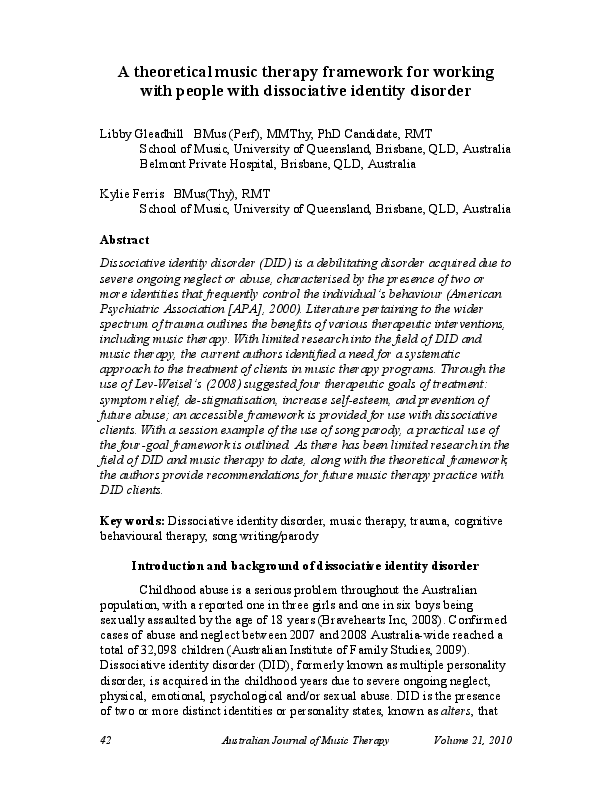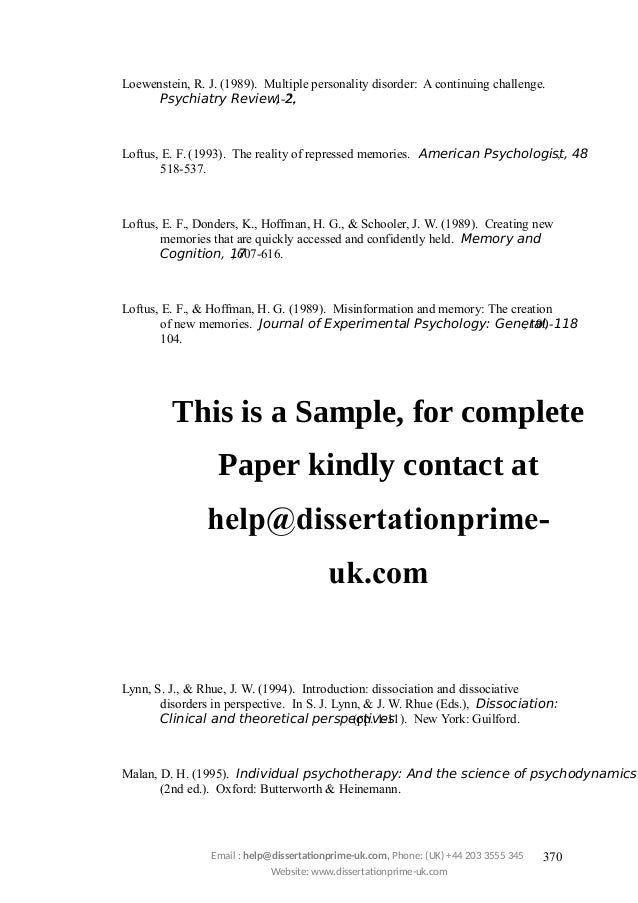
Introduction
· Sno, H., & Schalken, H. (). Dissociative identity disorder: diagnosis and treatment in the Netherlands [Abstract]. European Psychiatry, 14(5), Tsai, G., Condie, D., Wu, M. T., & Chang, I. W. (). Functional magnetic resonance imaging of personality switches in a woman with Dissociative Identity blogger.comted Reading Time: 8 mins The loss of memory is unforgiving and can be dangerous. Dissociative Identity Disorder is a psychological/memory loss disorder that can stem from early childhood abuse which includes extreme physical, emotional, and sexual abuse against the child. Not all children who experience abuse as at risk for the disorder · Dissociative identity disorder (DID) is a severe form of dissociative disorder with an estimated prevalence of about one per cent in general populations in mainly North American, European and Estimated Reading Time: 7 mins

Case Example: Mary (As Mary, Edith, “Baby”)
The loss of memory is unforgiving and can be dangerous. Dissociative Identity Disorder is a psychological/memory loss disorder that can stem from early childhood abuse which includes extreme physical, emotional, and sexual abuse against the child. Not all children who experience abuse as at risk for the disorder · Dissociative identity disorder (DID) is a severe form of dissociative disorder with an estimated prevalence of about one per cent in general populations in mainly North American, European and Estimated Reading Time: 7 mins scholarworks@blogger.com Dissociative identity disorder: features, etiology, and treatment Abstract Dissociative Identity Disorder appears to be diagnosed more frequently in the current clinical arena. This may be connected to increased awareness of how people respond and cope with traumatic events, both singular and prolonged or serial

· Despite its long and auspicious place in the history of psychiatry, dissociative identity disorder (DID) has been associated with controversy. This paper aims to examine the empirical data related to DID and outline the contextual challenges to its scholarworks@blogger.com Dissociative identity disorder: features, etiology, and treatment Abstract Dissociative Identity Disorder appears to be diagnosed more frequently in the current clinical arena. This may be connected to increased awareness of how people respond and cope with traumatic events, both singular and prolonged or serial · Dissociative identity disorder (DID) is a severe form of dissociative disorder with an estimated prevalence of about one per cent in general populations in mainly North American, European and Estimated Reading Time: 7 mins

The loss of memory is unforgiving and can be dangerous. Dissociative Identity Disorder is a psychological/memory loss disorder that can stem from early childhood abuse which includes extreme physical, emotional, and sexual abuse against the child. Not all children who experience abuse as at risk for the disorder Abstract. A brief description of the controversies surrounding the diagnosis of dissociative identity disorder is presented, followed by a discussion of the proposed similarities and differences between dissociative identity disorder and borderline personality disorder. The phenomenon of autohypnosis in the context of early childhood sexual trauma Author: Paulette Marie Gillig · Despite its long and auspicious place in the history of psychiatry, dissociative identity disorder (DID) has been associated with controversy. This paper aims to examine the empirical data related to DID and outline the contextual challenges to its

The loss of memory is unforgiving and can be dangerous. Dissociative Identity Disorder is a psychological/memory loss disorder that can stem from early childhood abuse which includes extreme physical, emotional, and sexual abuse against the child. Not all children who experience abuse as at risk for the disorder · According to the Diagnostic and Statistical Manual of Mental Disorders, 5th edition (DSM 5) published in , the symptoms of dissociative identity disorder include: The individual experiences two or more distinct identities or personality states, each with its own pattern of perceiving, relating to, and thinking about the self and the world · Dissociative identity disorder (DID) is a severe form of dissociative disorder with an estimated prevalence of about one per cent in general populations in mainly North American, European and Estimated Reading Time: 7 mins
No comments:
Post a Comment